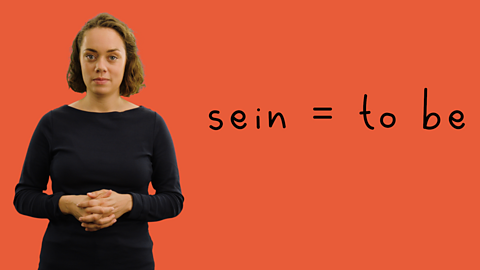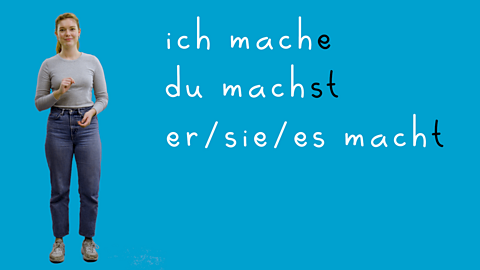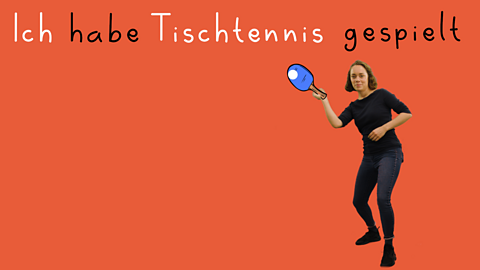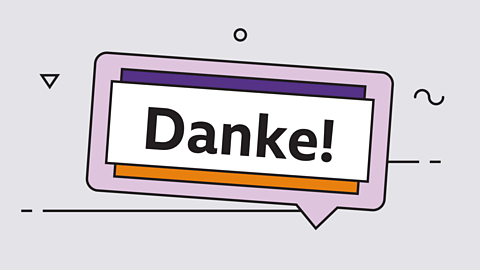An infinitive is the form of a verb that you find in the dictionary. It is the basic form of a verb before any changes for tense or people are made. In English, the infinitive can be thought of as the to form of a verb, like to eat or to go. German infinitives mostly end in -en, like spiel_en_ (to play).
How to use the infinitive in German
When you look up a verb in the dictionary what you find is the verb in the infinitive form.
In English itтs two words - тto swimт - but in German itтs just the one schwimmen.
In German, thereтs a group of verbs to help you say what you like, what you can and what you have to do.
Theyтre called modal verbs and they always come together with a verb in the infinitive form.
Ich mag is a modal verb. it means тI likeт.
When you put it with an infinitive - like schwimmen - you get ich mag schwimmen - тI like to swimт.
The other thing you need to know about modal verbs is that they send the infinitive to the end of the sentence, if itтs not there already.
Ich mag in der See schwimmen - I like to swim in the sea.
Ich mag jeden Morgen in der See schwimmen - I like to swim in the sea every morning.
АУЖВдВдБ№Вд means тto be ableт. Ich kann - тI am ableт or тI canт.
Ich kann schwimmen - I can swim.
ВбУМВѕВѕБ№Вд means тto have toт or тmustт. Ich muss - тI mustт.
Ich muss meine Mutter anrufen - I have to call my mum.
With ich mag, ich kann and ich muss, and an infinitive, you can say lots of things that you like, can and have to do!'
Ich muss jetzt gehen!
You can change the infinitive to use different tenses by adding different endings. You can conjugate a verb depending on whom you are talking about.

Conjugate means changing the endings of a verb to match the person doing the action.
You can use the infinitive when using modal verbs and the future tense.
Modal verbs
Modal verbs are verbs like can and must. They need an infinitive to help the sentence make sense. For example, the modal verb АьУЖВдВдБ№Вд (to be able to or can) needs an infinitive to make clear what it is you can do.
- Ich kann spielen - I can play.
- Ich kann Klavier spielen - I can play the piano.
The modal verb kann is the second idea in the sentence and the infinitive verb spielen goes to the end of the sentence.
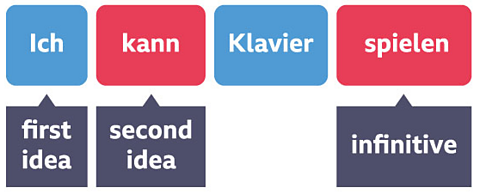
АУЖВдВдБ№Вд т can/to be able to
Take a look at the conjugations of АьУЖВдВдБ№Вд in the table below.
| English | German | Examples |
|---|---|---|
| I can | ich kann | Ich kann Klavier spielen - I can play the piano. |
| you can | du kannst | Du kannst gut Basketball spielen - You can play basketball well. |
| he can | er kann | Er kann schwimmen - He canswim. |
| she can | sie kann | Sie kann streng sein - She can be strict. |
ВбУМВѕВѕБ№Вд - must/to have to
Take a look at the conjugations of ГОУМВѕВѕБ№Вд in the table below.
| English | German | Examples |
|---|---|---|
| I must | ich muss | Ich muss meine Hausaufgaben machen - I must do my homework. |
| you must | du musst | Du musst lesen - You must read. |
| he must | er muss | Er muss essen - He must eat. |
| she must | sie muss | Sie muss Vokabeln lernen - She must learn vocabulary. |
MУЖgen - to like
To say you like to do something, use the verb ГОУЖВЕБ№Вд and an infinitive. Watch out, ГОУЖВЕБ№Вд is irregular. The stem ГОУЖВЕ- becomes mag-. Take a look at the conjugations of ГОУЖВЕБ№Вд in the table below.
| English | German | Examples |
|---|---|---|
| I like | ich mag | Ich mag schwimmen - I like to swim. |
| you like | du magst | Du magst Tee trinken - You like to drink tea. |
| he likes | er mag | Er mag tanzen - He likes to dance. |
| she likes | sie mag | Sie mag Rugby spielen - She likes to play rugby. |
Remember you can also use the adverb gern to say you like something.
- Ich esse gern Kuchen - I like to eat cake.
Wollen - to want
To say you want to do something, use the verb wollen and an infinitive. Watch out, wollen is irregular. The stem woll- becomes will-. Take a look at the conjugations of wollen in the table below.
| English | German | Examples |
|---|---|---|
| I want | ich will | Ich will lesen - I want to read. |
| you want | du willst | Du willst Pizza essen - You want to eat pizza. |
| he wants | er will | Er will ins Kino gehen - He wants to go to the cinema. |
| she wants | sie will | Sie will einen Kuchen machen - She wants to make a cake. |
The future tense: werden + infinitive
You can use infinitives to talk about the future, such as what you will do next weekend or next year. The future tense is made up of three parts:
1. A subject
The subject is the person or thing who does the verb. This will be a noun or a pronoun such as ich (I), du (you) or er/sie/es (he/she/it).
2. An auxiliary verb: werden
You have to use a conjugated form of werden in the present tense as an auxiliary verb. Along with the pronoun, a conjugated auxiliary verb helps you determine who is doing the action in the future. Watch out, werden is irregular! Take a look at the conjugations of werden in the table below.
| English | German |
|---|---|
| I will | ich werde |
| you will | du wirst |
| he will | er wird |
| she will | sie wird |
3. An infinitive
This tells you what action is happening in the future. An infinitive is the form of a verb that you find in the dictionary. It is the basic form of a verb before any changes for tense or people are made, like spielen - to play.
The auxiliary verb werden has to be the second idea in the sentence. The infinitive has to be at the end of the sentence.
- Ich werde Basketball spielen - I will play basketball.
- Du wirst nУЄchste Woche ins Kino gehen - You will go to the cinema next week.
- Er wird am Montag ein FuУballspiel sehen - He will watch a football match on Monday.
The future tense: present tense + time phrase
Remember, there is a simpler way to talk about the future. You can use the present tense with a time phrase:
- Ich gehe morgen in die Schule - Tomorrow I am going to school.
- Morgen gehe ich in die Schule - Tomorrow I am going to school.
Quiz
Complete the following phrases using your knowledge of modal verbs and the future tense. Use the English translations to help you.
Where next?
Discover more from around Bitesize.
More on Grammar
Find out more by working through a topic
- count7 of 8
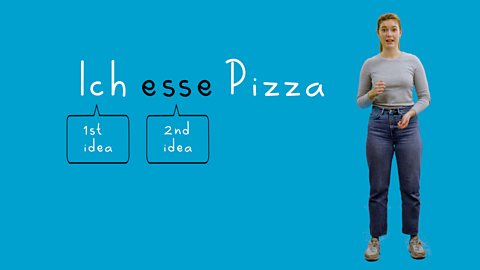
- count8 of 8

- count1 of 8
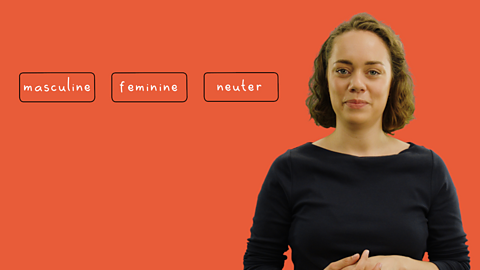
- count2 of 8
